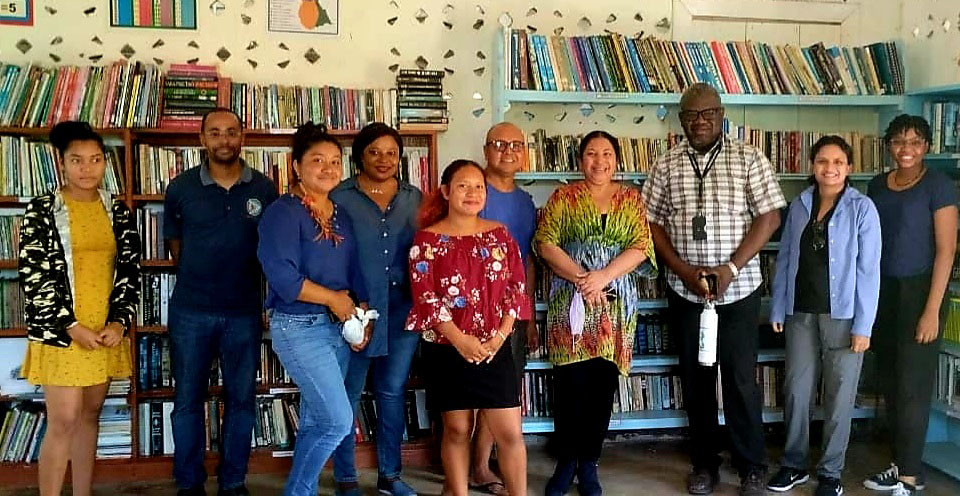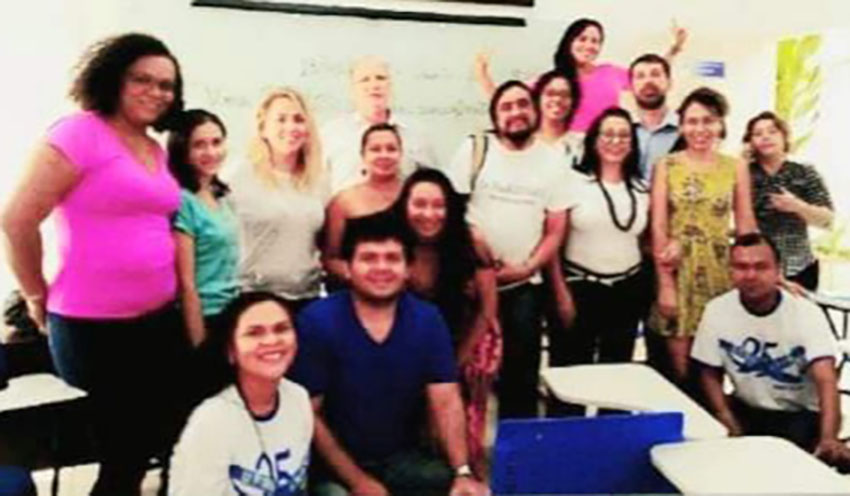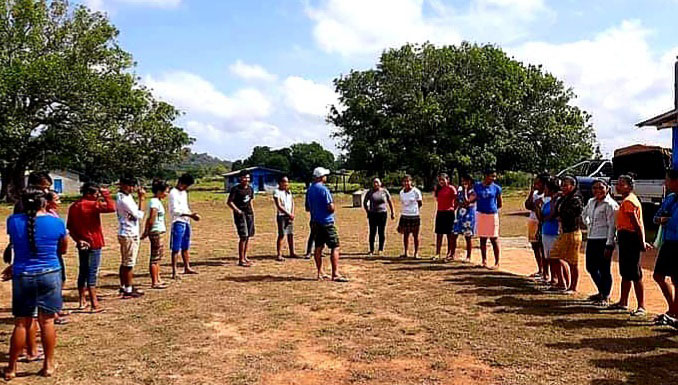Medino Abraham did not make the grade to attend Santa Rosa Secondary in Santa Rosa Village, Moruca, Region One (Barima/Waini); he attended Santa Rosa Primary Top and completed the Secondary Schools Proficiency Examinations then written by students in the community high school system, but today the 45-year-old religious and social educator is the holder of two university degrees.
“In a way I felt deprived of a secondary education because I didn’t make the marks to be among the first batch of students of the then new Santa Rosa Secondary School. They picked the cohort with the best marks because it was a new initiative. They needed the high flyers to show the authorities the need for the secondary school. Not boasting, but I have a bachelor’s degree and a master’s and I hope my journey can inspire young people,” he said. Abraham’s first degree is in pedagogy and education; his master’s is in Society and Frontiers with a focus on bilingual and Indigenous People’s education. He added, “And you never know, God willing, I could go to a further stage, to do a PhD.”
Abraham, a brother in the Jesuit order of the Roman Catholic Church for 21 years, now works in Aishalton on a bilingual programme with the nursery and primary schools in the South Rupununi. He told Stabroek Weekend, “I came to work in the Rupununi with the Jesuits to do more social work and share my knowledge in education. I am dealing more with the socio-educative aspects of the church.”
He is also the coordinator of a team of the newly-established Aishalton Centre for Jesuit Worldwide Learning, a distance education programme that caters for people on the margins of society, which offers courses in English language and other professional programmes. He is working with the first batch of students in person and online.
Coming from a humble background, Abraham said that to get involved in education, “I had to study and work… I studied and worked in the social environment to gain experience.”
He obtained his bachelor’s degree on a Jesuit scholarship at the Unisinos, a Jesuit university in the State of Rio Grande do Sul Brazil, and his master’s degree on a joint scholarship with the Brazilian Government and the Organization of American States (OAS) at the Federal University of Roraima also in Brazil.
“I spent a total of seven years in Brazil. I spent five years on the bachelor’s programme and then another two years on the master’s. My research for my master’s degree was on Indigenous education and society and frontiers. Because my research was based on the South Rupununi with a focus on the Wapichan people, I returned to Aishalton where I did most of my research,” he said.
Abraham is stationed in Aishalton with Guyanese priest Fr Joel Thompson who does the pastoral part and whom he also assists. The two are involved in the intercultural bilingual education ongoing at the Sawariwau, Karaudarnau and Maruranau nursery and primary schools.
“The Wapichan people are very advanced in the promotion of their language and culture and the church assists them in their promotional activities. I’m not in the frontline of things. I’m in the background assisting. I do animation projects. Education is not only a government thing,” he said.
Everyone must be involved, he added, noting that apart from the involvement of the National Centre for Educational Resource Develop-ment and Ministry of Education, the communities, the toshaos, non-governmental organisations, the church, among others are playing their part.
Teaching in the schools in English and Wapichan is now at the nursery level and at grade one in the primary schools. According to Abraham, “By September we hope to move up to grade two.” Many partners are on board in this programme, he said, but there is need for more generous donors to contribute to the libraries which are being established in the communities.
“We have libraries with materials in both English and in Wapichan. We are trying to promote the language and the people’s culture in publications. It is a venture that is now getting off the ground. We have a library here in Aishalton like a resource centre where the children come to read, research their homework on the internet. We are bringing digitalization to some of the villages here but not in a one-sided way. We are dialoguing with the people, making them aware of the advantages and disadvantages before they accept. I am here accompanying them in the various phases,” he said.
Abraham also assists in tutoring students in their foundation programme before they enter the teachers training programme at the Cyril Potter College of Education. “I do that part time. The foundation programme makes use of the local resource people on the ground and that is where I come in. I’m making use of my skills in that way. They are keeping me busy,” he said.
Abraham also works with a youth group in Aishalton.
“We’re trying to equip them with some skills. We try to keep them occupied during the week with worthwhile things. Our hands are full here with a number of activities. We have a volunteer from overseas – the USA. We are a team that includes the coordinator of the bilingual education team in the South Rupununi, Fr Thompson, the volunteer and myself. We are just a part in the whole scheme of things,” he added.
Roots
Abraham was born on the Kumaka Road and raised by his grandparents.
“From a young age they taught me to be a little farmer and to help myself. I learned a lot of practical things from them. They sent me to school. They ensured that I study. I had to go to church regularly. They had a well-planned out routine for me. I had to go to the farm. I had time to play too. I had a good childhood,” he recalled.
He attended Santa Rosa Primary School and he was never considered a high flyer.
“I was a middle ranger. In the afternoons after school I planted my little garden with vegetables and I reared fowls from an early age. We never bought vegetables or ground provisions from the shop. We planted those around the house. I was producing from small. I sold vegetables and eggs to buy my pencils, books and my school uniforms. My grandfather didn’t have a job. From an early age I was very independent and knew how to earn money. I come from a very humble background,” he added.
After writing SSPE part two, at 16 into 17 years, he was employed as a mailman at the Acquero Post Office. “I left school on a Friday afternoon and on the following Monday morning I was on the job at the post office. I had no time to idle. I took mail to people’s homes, I paid out old age pension and public assistance,” he recalled.
After two years he was transferred to the Guyana Post Office Corporation (GPOC) head office in Georgetown where he spent a year learning different things about the postal system. During that time, with some of the money he earned, he took private classes and then wrote several subjects at the Caribbean Secondary Education Certificate examinations, including English, Mathematics and Social Studies. He was successful. “From Moruca, I was determined to write CXC once I got the chance,” he said
When the workers at the GPOC took strike action, “because I was a very junior employee I was among those laid off,” he said.
Abraham then went to work in the goldfields in Mahdia where he spent six months. “I couldn’t do the big physical work. I wasn’t used to that so they put me to do ‘baheer’ work, that is to cook, burst firewood, clean up the kitchen area and such things,” he recounted
He had accumulated a fair amount of money and was about to return to the city when, he said, “a good bout of malaria hit me down and nearly killed me. All that money I worked for had to go back on helping me to recover. So I was back to square one in Georgetown.”
After recovering he found a job at a water business in the city and began to study again through distance education. While studying, he met Jesuit priests Fr Malcolm Rodrigues and Fr Chadwick who told him about a Jesuit scholarship and they encouraged him to study.
“I did a one-year study of the English language with them. Fr Chadwick had started a group called Hinterland Support Group to assist hinterland students studying in Georgetown of which I was a very active part. It is dormant now but I think it should be revived. I also visited patients at the Georgetown Public Hospital and I met with students at the Amerindian Hostel to see how they were doing,” he said.
His volunteer work with the group helped him to learn about social issues and how to deal with them.
In 2002, as a Jesuit novitiate he was sent to Jamaica to study and work for two years to join the Jesuit order at the Jesuit institution in Kingston.
“I did social work there too in the inner city. I am always in the struggle for the poor, visiting people in the hospital, picking up people off the streets. That was a tough job. I really don’t know how I got involved in that,” he said
From Jamaica, in 2005, he went to St Benedict’s seminary in Trinidad and Tobago to study Christology and sociology. After leaving St Benedict’s he worked for a year in the Pakaraimas among the Patamona people.
In 2007, he obtained a four-year Jesuit scholarship to study pedagogy and education at the Jesuit university in South, Brazil.
“I knew no Portuguese. A teacher taught me Portuguese for three months after which I had to write an exam and I passed it. While studying, I did social work and met with a lot of people living on the streets. I was never fearful going into the inner cities. I always went with people who knew the area. I have a very outgoing attitude. I like to meet people in an approachable way. I go to the gunmen, chat with them. They like my style and so I’m safe. I lived in the ghetto in downtown Kingston, Jamaica for two years. I worked in some of the ghettos in Brazil too. Very tough areas. I survived them by just adapting. I had to be street smart. You have to hone your intellectual ability but you have to be street smart also,” he related.
On his return to Guyana, he worked in the border community of St Ignatius in the Rupununi where he also did some volunteer teaching at St Ignatius Secondary. “I was always in education after my initial studies in Brazil helping with extra or co-curricular classes for students,” he noted.
Then he obtained a joint scholarship from the Brazilian government and the OAS to pursue a master’s degree in Society and Frontiers with focus on education and Indigenous Peoples. There he looked at how formal education impacted indigenous culture. Having graduated he returned to the South Rupununi to work.
“This is where I am now trying to convert my theoretical knowledge into practice. I have been working mainly with the less fortunate, on social justice programmes, and I have been on the side of the underdogs. But I have also been fortunate to dialogue and work with those in authority, the elites and the more privileged who could help the less fortunate. I’m sure I have helped people out of unfortunate circumstances. I’m sure I have also inspired some people to be serious about their education. There are people who tell me occasionally that based on what I told them they are now who they are,” he said.
Asked about his own Indigenous Lokono/Arawak language, Abraham said, “People hit me with that a lot – not knowing my own language. People in South Rupununi are happy that an outsider is learning their Wapichan language. At the same time, I don’t know my indigenous language. I am not learning Wapichan deliberately. It’s coming naturally. I have a heart for my own Arawak language but the issue is how to revive it. It’s a worrying and sad situation. But yeah, I hope I can help to revive it in Moruca someday.”
Abraham is fluent in Portuguese and said he can “get by” in South America using Spanish.
“Apart from Brazil I have travelled to Argentina, Uruguay, Paraguay, Colombia and Peru to attend meetings about Amazonia, our Indigenous Peoples, culture, education and research and other social forums mainly with and about Indigenous peoples,” he stated.
He also spent some time working in Belize where he said the topography reminded him of Guyana. He has also travelled to North America to attend meetings and for spiritual retreats.
“The travels exposed me to different experiences, different cultures and to respect our cultures,” he noted
He has done three stints in Aishalton on the South Rupununi programme.
“I did my first stint in 2013. I went away and then I returned in 2015 and then after my masters in 2022. I am now with the bilingual programme for about four to five years. The Wapichan programme started before me,” he said.
“I’m basically animating the parents, the teachers and the community, encouraging them in what they do and documenting the programme. I just finished interviewing three of the nursery teachers on their experience over the past five years. Hopefully, I can write a book about the bilingual programme soon.”










